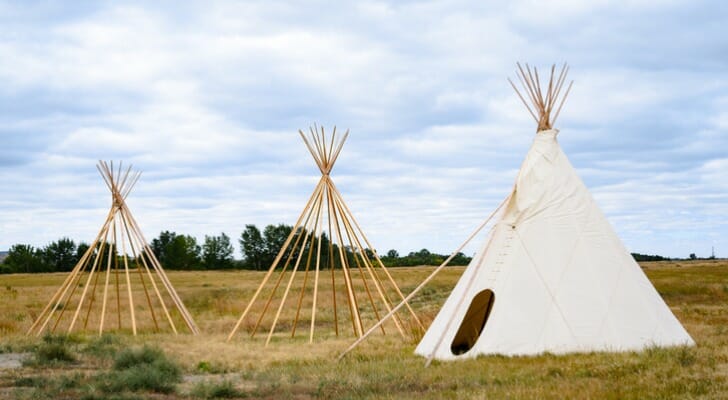A Guide to North Dakota Inheritance Laws
North Dakota does not levy an estate tax or an inheritance tax. But North Dakota has other inheritance laws of which you should be aware, including rules concerning intestate succession, probate, taxes, what makes a will...Tuesday, March 10th 2020, 1:01 pm
By Rachel Cautero
 North Dakota does not levy an estate tax or an inheritance tax. But North Dakota has other inheritance laws of which you should be aware, including rules concerning intestate succession, probate, taxes, what makes a will valid and more. If you want professional guidance for your estate planning after reading this article, the SmartAsset matching tool will pair you with capable financial advisors in your area.
North Dakota does not levy an estate tax or an inheritance tax. But North Dakota has other inheritance laws of which you should be aware, including rules concerning intestate succession, probate, taxes, what makes a will valid and more. If you want professional guidance for your estate planning after reading this article, the SmartAsset matching tool will pair you with capable financial advisors in your area.
Does North Dakota Have an Inheritance Tax or Estate Tax?
The Peace Garden State does not levy an inheritance tax. You also won’t have to pay an estate tax in North Dakota. But if you inherit property from someone who lived in (or owned property in) a state with an inheritance tax, then you may be responsible for paying that tax.
Also remember that the federal estate tax kicks in if an inherited estate is more than $11.58 million in 2020. The federal estate tax is only taxes on the overage of an estate (in other words, the amount more than $11.58 million someone leaves behind). The rate can be as much as 40%.
Remember, estate taxes and inheritance taxes are different. Also called the death tax, estate taxes are taken out of the deceased’s estate immediately after their passing, while inheritance taxes are imposed upon the deceased’s heirs after they have received their inheritance.
North Dakota does not levy the gift tax, but the federal gift tax applies if you give or are gifted more than $15,000 in one calendar year.
As for other taxes, the state partially taxes Social Security benefits, and taxes withdrawals from retirement accounts and pensions. Its progressive income tax tops out at a mere 2.9%.
Other Necessary Tax Filings- Inheritance tax from another state – While North Dakota does not levy an inheritance tax, if you inherit assets from someone who either lived in a state or owned property in a state that does, you may be responsible for paying them.
- Federal estate tax – Regardless of the state in which you reside, the federal estate tax is applied if an inherited estate tops out at more than $11.58 million in 2020. But don’t panic, this tax only applies to the overage, though the rate can be as high as 40%.
To file any of these estate-based returns, you’ll need to apply for an employer identification number (EIN) with the IRS. You can do this online, by fax or via mail.
Dying With a Will in North Dakota Dying with a valid will and last testament in North Dakota means it supersedes the state’s intestacy laws. Dying testate, or with a valid will and last testament, affords you the most control over how and to whom your estate is distributed after your death.
Dying with a valid will and last testament in North Dakota means it supersedes the state’s intestacy laws. Dying testate, or with a valid will and last testament, affords you the most control over how and to whom your estate is distributed after your death.
But if you die without a valid will and last testament in place, that’s called dying intestate. It means that your estate will then be subjected to your state’s succession laws. It may also have to go through the probate process. In most cases, it’s best to avoid the probate process, as it can be lengthy and expensive.
To die with a valid will and last testament in North Dakota, there are several requirements that need to be met. First, the testator must be an adult, of sound mind, must be signed by the testator and two witnesses or notary public, it must be in writing, and finally, it must name a beneficiary.
In North Dakota, an estate skips formal probate if it’s $50,000 or less, in which case it would undergo a simplified probate process. Generally, there are three different paths probate can take in North Dakota – informal probate, used when there are no disputes anticipated and all expected heirs are getting along; unsupervised formal probate, in which part of the settling of the estate is supervised by the courts; and finally, supervised formal probate, in which the entire probate process is overseen by the court.
North Dakota adheres to the Uniform Probate Code, a standardized set of probate procedures used across 15 states.
Dying Without a Will in North DakotaDie intestate in North Dakota, or without a valid will and last testament in place, and the distribution of your estate will be subject to the state’s intestate succession laws. As mentioned, your estate may also have to go through the probate process, which can be both lengthy and expensive.
If you die intestate in North Dakota, your estate will pass on to your closest living relatives, but to whom depends on who you leave behind – spouses, children, parents, even siblings. There are also some assets that are exempt from North Dakota succession laws, such as property in a living trust, retirement or life insurance funds, transfer on death accounts or real estate, payable on death bank accounts, and jointly owned property.
Spouses in North Dakota Inheritance LawGenerally speaking, if you die without a will in North Dakota, your spouse will be entitled to a large share of your assets. However, whether you have other heirs, such as children, parents, or siblings, may affect how large a share they receive.
Die intestate and leave behind a spouse but no children or parents, and your spouse inherits your entire estate. If you leave behind a spouse and children with that spouse (and your spouse has no other children), then your spouse will inherit your entire estate.
However, if you leave behind a spouse, children, and your spouse has children from another relationship, your spouse gets the first $225,000 of your estate, plus ½ of the balance, while your descendants get the remainder.
If you die intestate with a spouse and children with someone other than that spouse, your spouse gets the first $150,000 of your estate, plus ½ of the balance, while your children get everything else.
And finally, if you die without a will and have both a surviving spouse and parents, your spouse gets the first $300,000 of your estate, plus 3/4 of the balance, and your parents get the rest.
Children in North Dakota Inheritance LawDie intestate in North Dakota and your children will inherit part of your estate. However, how much they receive depends on whether you also leave behind a spouse, if those children are with your surviving spouse, and if you have children with someone other than your surviving spouse.
For example, if you die intestate and leave behind a spouse, children, and your spouse has children from another relationship, your spouse gets the first $225,000 of your estate, plus half of the balance, while your descendants get the remainder. But if you die and leave behind a spouse and children with that spouse, your spouse inherits your entire estate.
If you leave behind a spouse and children with someone other than that spouse, then your spouse gets the first $150,000 of your estate, plus half of the rest, while your children or descendants get the remainder.
But if you die intestate with only surviving children and no spouse, then your children inherit your entire estate.
As with many states, in North Dakota, children only receive their share of your intestate assets if they are legally recognized children by the state. So, they have to be adopted, born within marriage, or born outside of marriage if a marriage later occurred or paternity was established. Grandchildren are also eligible to receive a share.
Intestate Succession: Spouses and Children Inheritance Situation Who Inherits Your Property – Spouse but no children or living parents – Entire estate to spouse – Children but no spouse – Entire estate to children – Spouse and children with that spouse – Entire estate to spouse – Spouse and children with someone other than spouse – Spouse gets the first $150,000 of your estate, plus ½ of the rest; children get the rest – Spouse and children with spouse and spouse has children from previous relationship – Spouse gets first $225,000 of your estate, plus ½ of the balance; your children get the rest – Spouse and parents -Spouse inherits $300,000, plus 3/4 of the balance; parents get the rest Unmarried Individuals Without Children in North Dakota Inheritance LawDie unmarried and intestate in North Dakota and your estate goes to your children in equal shares. If you don’t have any children, then your parents are next in line. Finally, if you don’t have a spouse, children, or surviving parents, then your estate will go to your grandparents, or descendants of your grandparents. If the state is unable to locate any surviving family, then your intestate property goes back to the state, though this is rare.
Keep in mind that the aforementioned succession laws are only enacted in the case of an intestate estate. If a valid will and last testament are in place, it takes precedence over a state’s succession law.
Intestate Succession: Extended Family Inheritance Situation Who Inherits Your Property Children but unmarried Entire estate to children Siblings but no children, spouse or parents Entire estate to siblings Parents but no spouse or children Entire estate to parents Non-Probate North Dakota InheritanceIn North Dakota, there is some property that is exempt from intestate succession laws, such as joint tenancy assets, in which an asset is jointly owned and passes along to the surviving owner in the event of death, community property in which the asset passes on to the surviving spouse and retirement accounts and life insurance policies with named beneficiaries.
Other Situations in North Dakota Inheritance LawThere are some unique situations in North Dakota’s inheritance laws to consider. First, in order to inherit their share of your intestate property, an heir must live 120 hours longer than you. This is called the survivorship period. Second, half relatives are treated the same way under the law as whole relatives. And finally, an heir’s immigration status has no bearing on whether they are able to accept their share of your intestate property.
Resources for Estate PlanningManaging your own estate, or handling the intricacies of inheriting money, can get complicated. That’s why many people choose to work with a professional.
The SmartAsset financial advisor matching tool can match you with nearby financial advisors equipped to handle your estate and inheritance planning needs. If you’re ready to work with a financial advisor in your area, get started now.
Photo credit: ©iStock.com/cliffordpugliese, ©iStock.com/DenisTangneyJr, ©iStock.com/ChrisBoswell, ©iStock.com/zrfphoto
The post A Guide to North Dakota Inheritance Laws appeared first on SmartAsset Blog.
Information contained on this page is provided by an independent third-party content provider. Frankly and this Site make no warranties or representations in connection therewith. If you are affiliated with this page and would like it removed please contact pressreleases@franklymedia.com
More Like This
March 10th, 2020
December 14th, 2024
December 14th, 2024
December 14th, 2024
Top Headlines
December 14th, 2024
December 14th, 2024
December 14th, 2024
December 14th, 2024








